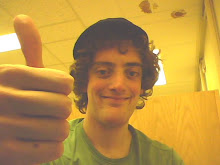Of course, tenants of the Beat Hotel didn't have everything they needed at the Beat Hotel. Madame Rachou did not offer all of the necisities they needed. To get food the Beatniks would need to go out and fend for themselves. God, know I have an image of nature documentaries following Allen Ginsberg around.
"Observe the Beatnik, forced out of America by legal difficulties concerning the obscenity of his work, he finds a safe home for himself in cheep French hotels."
"Hey Peter Orlovsky, my long-time partner, who are those British guys behind us with the cameras?"."Observe the Beatnik, forced out of America by legal difficulties concerning the obscenity of his work, he finds a safe home for himself in cheep French hotels."
"I don't know, Allen Ginsberg. Ignore them and maybe they'll leave us alone."
"I'm going to give them a copy of Jack's new novel On the Road. Hey, camera people!""Oh no, the Beatnik has seen us. Run away!"
"Hey, come back. I have free literature! It's really good!"I am probably going to use this. I'll do something with William S. Burroughs to, but he'll probably just pull a gun on them.
Anywhere, here is a list of establishments not to far from the Beat Hotel where our heroes will attend without having to actually take part in French society to much.- Ali Baba, a grocery store on the rue de la Huchette, where one could buy food up until 2 AM. Fruit was kept outside and protected by string netting.
- Café des Arts, a cheep restaurant frequented by arts students. The menu was a fixed three-course menu and red wine. The tables where bare and wooden and a flagon liter was on them, full of the aforementioned wine.
- Chez Jean, located in a passageway of the Blvd St. Germain, it was basically a Parisian dive-bar where the Parisian Bohemia and underworld lived in an uneasy alliance. The floors where saw dust. Since this is a mystery series this will probably be a common setting. Jack probably knows some weaselly-looking guy who knows everything that goes on in the crime world and is called "The Rat" or something like that. Sometimes a cellist or guitarist played there.
- Chez Raton, a small café that had to wind down the baskets of bread, which where hung from the room by rope to save room.
- Libraire Anglaise, also called the English Bookshop. Located at 42 rue de Seine, intersecting with the rue de l’Echaude. It owned by Gait Froge, a "beautiful, petite Frenchwoman."(Miles 21) She was a big fan of American and English writers and spoke with a cultured British accent. She specialized in Olypmia Press titles. The shop was almost triangular in an old building dating back to the 1500s. It was filled with self-published poetry and rare books, all piled up in the room. Parties for the launch of Olympia Press’ more literary books where held in her basement, which looked like a medieval dungeon lighted by wine bottles in candles.
- The Mistral, the only other really decent English bookstore, it was run by George Whitman. He came over to help with resettling war orphans and eventually settled into book selling. He bought the Mistral in 1951, which used to be an Arab grocery. It was larger then the English Bookstore, and had rooms for poets to stay at. Gait Froge believed that George Whitman worked for the CIA, and both had an intense rivalry. He didn't sell Olympia Press books.
- Olympia Press, Not actually a place, but it was a publishing house that would later print the first edition of Naked Lunch. It was most famous for printing banded books that the Americans and English thought where obscene, such as Nabakov’s Lolita, Jean Genet’s The Thieves Journal and pretty much anything by the Marquis de Sade. When they weren’t publishing books that where considered pornography, they where publishing pornography. I’m thinking that this may be an operation of the Pact of Lilith.
- Palette, an artist café "where one could meet a gallery owner to plan a show, hire a model, or buy drugs."(Miles 9)
That's all the real locations I could find in the book I got. I will probably be making up a few other places, such as the local Pact of Lilith safe-house, which should have a name like Our Lady of the Flowers, or something that sounds like a Catholic Church. Also, there will probably be some hidden away occult store somewhere.
Miles, Barry. The Beat Hotel: Ginsberg, Burroughs and Corso in Paris, 1957-1963. New York, Grove Press, 2000

5 comments:
Youre such a great writer and thinker! Inspiring!
Thank you, stranger.
I have a question for you totally non related to your post. Does Duotrope's website load for you?
Yeah, why? Having problems?
More than you know.
Post a Comment